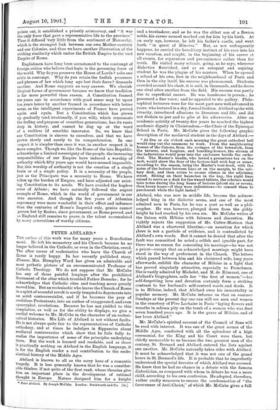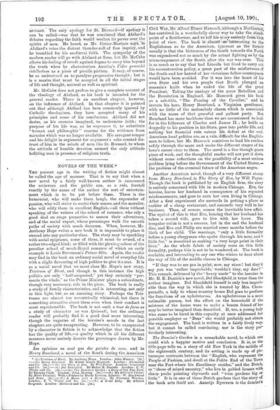PETER ABELARD.*
THE author of this work was for many years a Benedictine monk. He left his monastery and his Church because he no longer believed in the Catholic, or even in the Christian, creed. The after career of ecclesiastics who leave the Church of Rome is rarely happy. In her recently published story, Eleanor, Mrs. Humphry Ward has given an admirable and most pathetic picture of an excommunicated Professor of Catholic Theology. We do not suppose that Mr. McCabe has any of those painful longings after the prohibited Sacrament of the altar which troubled Father Benecke ; for he acknowledges that Catholic rites and teaching never greatly moved him. But an ecclesiastic who leaves the Church of Rome in a spirit of scornful revolt is sorely tempted to degenerate into an acrid controversialist, and if he becomes the prey of credulous Protestants, into an author of exaggerated, and even apocryphal, revelations. Because he has not yielded to this temptation, as well as for the ability he displays, we give a cordial welcome to Mr. McCabe in the character of an ecclesi- astical historian. His Life of Abelard is not without faults. He is not always quite fair to the representatives of Catholic orthodoxy, and at times he indulges in flippancies about mediaeval controversies which show that he fails fully to realise the importance of some of the principles underlying them. But the work is learned and 'readable, and as there is practically nothing on Abelard in the English language, it is for the English reader a real contribution to the eccle- siastical history of the Middle Ages.
Abelard is known to all as the sorry hero of a romantic tragedy. It is less generally known that he was a consider- able thinker, if not quite of the first rank, whose theories give him an important place in the development of rational thought in Europe. Nature designed him for a knight
• Baer Abaard. By Joseph McCabe. London : Duckworth and Co. [6s.]
and a troubadour, and as he was the eldest son of a Breton noble, his career seemed marked out for him by his birth. At an early age, however, he left his father's castle, and went forth " in quest of Minerva." But, as not unfrequently happens, he carried the hereditary instinct of his race into his new vocation, and sought, in the beginning of his career at all events, for reputation and pre-eminence rather than for truth. He visited many schools, going, as he says, wherever dialectics flourished, and as an arrogant and aspiring student he was the plague of his masters. When he opened a school of his own, first in the neighbourhood of Paris and then in the city itself, his success was phenomenal. Students crowded around his chair, it is said, in thousands, and he drove one rival after another from the field. His success was partly due to superficial causes. He was handsome in person ; he possessed a fine voice; and he appealed to she gallery. Philo- sophical lecturers were for the most part men well advanced in years, who lectured in a dry, formal fashion. Abelard spoke with vivacity, introduced allusions to literature and life, and did not disdain to jest and to gibe at his adversaries. After an academic activity of twenty-five years he reached the highest academic dignity in Christendom,—the Chair of the Episcopal School in Paris. Mr. McCabe gives the following graphic description of the mediaeval student in the days of Abelard :—
" At five or six o'clock each morning the great cathedral bell would ring out the summons to work. From the neighbouring houses of the Canons, from the cottages of the townsfolk, from the taverns, and hospices, and boarding-houses, the stream of the industrious would pour into the enclosure beside the cathe- dral. The Master's beadle, who levied a precarious tax on the mob, would strew the floor of the lecture-hall with hay or straw, according to the season, bring the Master's text-book, with the notes of the lecture between lines or on the margin, to the soli- tary desk, and then retire to secure silence in the adjoining street. Sitting on their haunches in the hay, the right knee raised to serve as a desk for the waxed tablets, the scholars would take notes during the long hours of lecture (about six or seven), then hurry home—if they were industrious—to commit them to parchment while the light lasted."
Abklard, who was now in middle life, became the acknow- ledged king in the dialectic arena, and one of the most admired men in Paris, for he was a poet as well as a phil- osopher. He was, however, plunged down from the giddy height he had reached by his own sin. Mr. McCabe writes of the liaison with Heloise with fairness and discretion. He rightly rejects the suggestion of Mr. Cotter-Morison that Abelard was a chartered libertine,—an assertion for which there is not a particle of evidence, and is contradicted by Abelard's own words. But it cannot be denied that after the fault was committed he acted a selfish and ignoble part, for there was no reason for concealing his marriage—he was not a priest—except that an acknowledged marriage might have stood in the way of preferment in the Church. The letters which passed between him and his cloistered wife, long years afterwards, exhibit the character of Heloise in a light that has proved singularly attractive, especially to Frenchmen. She is vastly admired by Michelet, and M. de Remusat, one of Abelard's biographers, calls her "the first of women,"—her self-forgetting love and devotion certainly form a striking contrast to her husband's self-centred words and deeds. It is to Heloise, indeed, that Abelard owes his immortality in popular memory. Mr. McCabe informs us that on summer Sundays at the present day one can still see men and women in the cemetery of Pere Lachaise in Paris "laying flowers and wreaths in solemn pity on the tomb of a woman who was dust seven hundred years ago. It is the grave of Heloise, and of her lover Abelard."
Mr. McCabe's spirited account of the Council of Sens will be read with interest. It was one of the great scenes of the Middle Ages, conducted with all the splendour of a high
ceremonial, for the King and his Court were there, but chiefly memorable to us because the two greatest men of the century, St. Bernard and Abelard, entered the lists against one another. Mr. McCabe naturally takes sides with Abelard.
It must be acknowledged that it was not one of the grand hours in St. Bernard's life. It is probable that he imperfectly understood the special heresies of which Abelard was accused.
He knew that he had no chance in a debate with the famous dialectician, as compared with whom in debate he was a mere child, according to his own confession. He adopted, therefore,
rather crafty measures to ensure the condemnation of "the forerunner of Anti-Christ," of which Mr. McCabe gives a fall account. The only apology for St. Bernard—if. apology it can be called—was that he was convinced that Abelard's debates regarding the faith would -weaken its power over the spirits of men. He beard, as Mr. Cotter-Morison says, hi Abelard's voice the distant thunder-roll of free inquiry, and he trembled for his medireyal. faith. The sympathy of the modern reader will go with Abelard at Sens, but Mr, McCabe allows his feeling of revolt against dogma to carry him beyond the truth when he characterises Anselm's Fides pr.lecedit intellecturn as a piece of puerile pietism. It may, of course, be so understood as to paralyse progressive thought ; but it is a maxim that must be accepted in all the initial stages of life and thought, natural as well as spiritual.
Mr. McCabe does not profess to give a complete account of the theology of Abelard, as his book is intended for the general reader. There is an excellent chapter, however, on the influence of Abelard. In that chapter it is pointed oat that although Abelard has been commonly ignored by Catholic theologians, they have accepted many of his principles and some of his conclusions. Abelard did not desire, as his enemies imagined, to undermine faith ; the purpose of his life was, as he expresses it, to substitute " human and philosophic " reasons for , the evidence from miracles which was no longer available. His arrogant temper and his delight in argument for argument's sake created dis- trust of him in the minds of men like St. Bernard, to whom the attitude of humble devotion seemed the only attitude befitting man in presence of religious truth. .



































 Previous page
Previous page